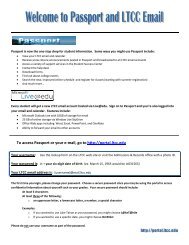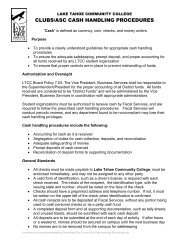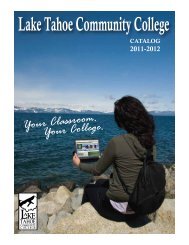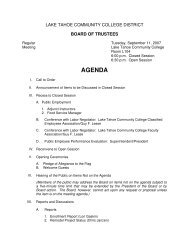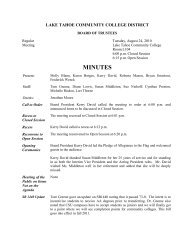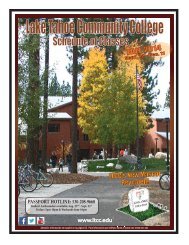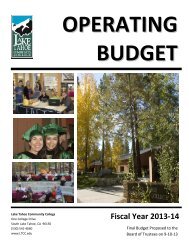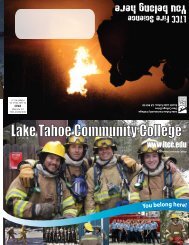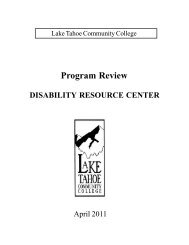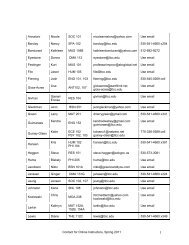View the 2010-2011 Catalog (4 MB) - Lake Tahoe Community College
View the 2010-2011 Catalog (4 MB) - Lake Tahoe Community College
View the 2010-2011 Catalog (4 MB) - Lake Tahoe Community College
- No tags were found...
You also want an ePaper? Increase the reach of your titles
YUMPU automatically turns print PDFs into web optimized ePapers that Google loves.
CERTIFICATES3. GLOBAL CUISINEStudent Learning Outcomes for this certificate are:• Utilize a knife to fabricate a variety of food products for <strong>the</strong> purpose ofpreparing <strong>the</strong> foods for cooking and consumption.• Cook and prepare foods that are representative of various worldcultures.• Prepare soups, salads, meats, grains, vegetables, and potatoes.• Practice <strong>the</strong> principles of sanitation and food safety to prevent <strong>the</strong>spread of food-borne illness.• Identify and apply <strong>the</strong> various stages of bread-baking.A. REQUIRED COURSES29 units distributed as follows:1. All courses from <strong>the</strong> following:CUL 101 Introduction to <strong>the</strong> Culinary Arts ProfessionCUL 102 Principles and Practices of Basic Food PreparationCUL 103 Food Sanitation and SafetyCUL 104 Principles and Practices of Baking and Pastry ArtsCUL 106 Principles and Practices of Intermediate FoodPreparationCUL 125 Wines of <strong>the</strong> WorldCUL 172A Middle Eastern CuisineCUL 172B The Cuisine of IndiaCUL 172C Mexican Regional CuisineCUL 172D French Regional CuisineCUL 202 Global Cuisine4. WINE STUDIESStudent Learning Outcomes for this certificate are:• Utilize a knife to fabricate a variety of food products for <strong>the</strong> purpose ofpreparing <strong>the</strong> foods for cooking and consumption.• Prepare soups, salads, meats, grains, vegetables, and potatoes.• Practice <strong>the</strong> principles of sanitation and food safety to prevent <strong>the</strong>spread of food-borne illness.• Experience and evaluate <strong>the</strong> sensory aspects of wine.•••A. REQUIRED COURSES25.5-26 units distributed as follows:1. All courses from <strong>the</strong> following:CUL 101 Introduction to <strong>the</strong> Culinary Arts ProfessionCUL 102 Principles and Practices of Basic Food PreparationCUL 103 Food Sanitation and SafetyCUL 104 Principles and Practices of Baking and Pastry Arts- or -CUL 106 Principles and Practices of Intermediate FoodPreparationCUL 125 Wines of <strong>the</strong> WorldCUL 128 Wines of CaliforniaCUL 226 Food and Wine88LTCC CATALOG <strong>2010</strong>-<strong>2011</strong>EARLY CHILDHOOD EDUCATIONThe Early Childhood Education certificate is designed to prepare studentsfor employment as aides, teachers, directors, and entrepreneurs inpreschools, child care centers (including infant/toddler facilities), and familychild care programs. Courses are also appropriate for parents, nannies, campcounselors, recreation leaders, elementary teaching assistants, social serviceand health care practitioners, administrators and o<strong>the</strong>rs working with youngchildren.Student Learning Outcomes for this certificate are:• Evaluate <strong>the</strong> needs, <strong>the</strong> characteristics, and <strong>the</strong> multiple influences ondevelopment of children birth to age eight as related to high qualitycare and education of young children.• Design, implement, and evaluate environments and activities thatsupport positive, developmental play and learning outcomes for allchildren.• Apply effective guidance and interaction strategies that support allchildren's social learning, identity, and self-confidence.• Develop strategies that promote partnerships between programs,teachers, families, and <strong>the</strong>ir communities.• Demonstrate ethical standards and professional behaviors that deepenunderstanding, knowledge, and commitment to <strong>the</strong> early childhoodprofession.•••A. REQUIRED COURSES:36 units distributed as follows:1. All courses from <strong>the</strong> following:ECE 100 Health, Safety and Nutrition for Young ChildrenECE 101 Introduction to Early Childhood EducationECE 102/PSY 102 Child and Adolescent DevelopmentECE 103 Child, Family and <strong>Community</strong>ECE 110 Curriculum Development in Early ChildhoodEducation ProgramsECE 202 Practicum in Early Childhood Programs: FieldExperienceECE 203 Administration and Supervision of Early ChildhoodPrograms2. Two courses from <strong>the</strong> following:ECE 109 Children’s LiteratureECE 120 Creative Experiences for Young ChildrenECE 121 Math and Science Experiences for Young ChildrenECE 125 Positive Child GuidanceECE 127 Infant and Toddlers: Development and CareECE128 Principles of SupervisionECE 129ECE 204The Exceptional ChildAdvanced Administration and Supervision of EarlyChildhood Programs



